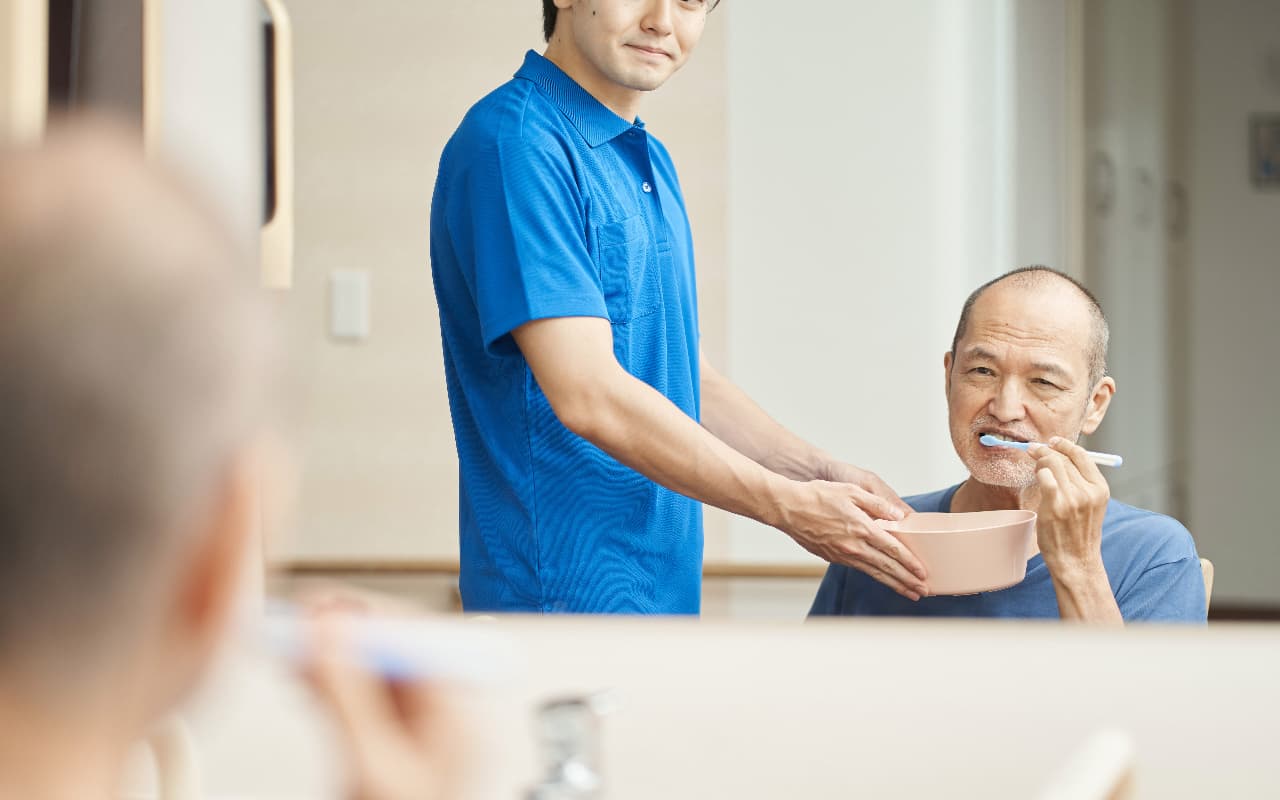Dementia Care 101: Assisting a Loved One with Oral Hygiene
0
Written by Chad Birt on Mon Jan 16 2023.

Caring for a loved one with Alzheimer’s disease or another type of dementia presents unique challenges. One of those challenges is helping them maintain good oral health.
As these conditions progress, your loved one may forget how to brush and floss or forget why good oral hygiene is important in the first place.
It can be hard seeing these changes take place, but there are different things you can do to make your responsibilities easier. To assist us with this article, we reached out to several experts, including:
Sharhrooz Yazdani, DDS, CEO and Director of Costello Family Dentistry in Ontario, Toronto Canada
Kristen Galloway, a licensed occupational therapist and certified dementia care specialist, who owns Functional Movement, a private occupational therapy practice in Ponte Vedra, FL.
Mark Joseph, Founder of Parental Queries, and a former family caretaker
Below, you’ll find a list of simple tips and tricks for assisting your loved one with oral hygiene.
Establish a regular oral hygiene routine
The American Dental Association (ADA) recommends all adults brush their teeth twice daily and floss once a day.
If you want to make brushing and flossing a habit, you need to incorporate them into your caregiving schedule.
“Routine is the keyword!” Galloway said. “Consistency is key in working with individuals with dementia. Create a routine and stick with it!”
Dr. Yazdani agrees.
“Routines are about being consistent with your actions and performing them at times of the day when your loved one is most motivated. For example, brushing your loved one’s teeth when they wake in the morning is usually easiest and feels natural for most.”
“Try to reserve time each day to take care of oral hygiene with your loved one. Their energy levels may fluctuate, so it can be beneficial to do the second round of teeth brushing well before your loved one settles in for their bedtime routine.”
Set out all of the necessary materials
It’s easy for people with Alzheimer’s disease and dementia to lose focus or become overwhelmed. You may be able to reduce some confusion and minimize arguments by prepping the supplies in advance.
“Only set out the necessary supplies,” said Galloway. “Clear the area of any other items that could lead to confusion.”
The necessary supplies for oral hygiene include:
Toothpaste
A soft bristle toothbrush
Dental floss, floss picks, or a proxa brush
Antibacterial mouthwash (optional)
Denture cleaning solution (if your loved one wears dentures)
Pro tip: “If your loved one forgets how to brush their teeth, or they get confused, set out a second toothbrush as a prop,” Dr. Yazdani said. “Your loved one may find that “mirroring” your actions helps jog their memory.”
Remind your loved one how to brush and floss
After setting out the necessary supplies, remind your loved one how to brush and floss.
“You may want to use visual cues to help them remember the sequence of steps,” Galloway said. “For example, a chart with pictures and steps in numbered order can help them stay on track.”
It may also help to remind them about why good oral hygiene is important.
“Instead of just sticking the toothbrush in your loved one’s mouth, discuss with them the last time they brushed their teeth,” Dr. Yazdani said. “Then, remind them it’s time to brush them again and explain why it’s essential. This can prevent arguments and make brushing and flossing easier.”
Watch your loved one brush and floss
Encourage your loved one to brush their teeth. At first, it may help to apply the toothpaste to their toothbrush yourself.
“Show your loved one how much toothpaste to use and how long they should brush,” said Joseph. “Then, provide assistance or supervision, so that process can be done safely.”
“Allow your loved one to perform as much of the task as possible,” Galloway said. But remember that everyone’s capabilities vary.
Flossing, in particular, can be more challenging than brushing.
“It’s a more intimate activity and requires nimble movements of the fingers, which can be daunting for older people,” Dr. Yazdani said. “Using floss picks, toothpicks, or proxabrushes can make flossing easier. A proxabrush has an extended handle so you can floss your loved one’s teeth for them.”
Caregiving Tip: Sometimes, people with Alzheimer’s disease or dementia become agitated.
“You want to avoid touching your loved one, especially around the mouth, if they don’t consent,” Dr. Yazdani said. “If your loved one refuses to brush or floss their teeth, take a time out and try again later.”
What if my loved one has dentures?
If your loved one has dentures, oral hygiene remains important!
“Make sure to follow instructions from the dentist,” Dr. Yazdani said. “However, brushing and flossing twice daily should be standard practice. Removable dentures should be soaked outside the mouth in either denture cleaner or a water-vinegar solution. If your loved one has removable dentures, you can remove and brush them yourself.”
Are there other ways to keep my loved one’s teeth and gums healthy?
Some people with neurodegenerative illnesses are unable to brush or floss on their own. Still, there are ways to keep your loved one’s teeth and gums healthy.
“If your loved one refuses to brush or floss, make sure they drink lots of water,” Dr. Yazdani said. “Another tip is to use textured teeth wipes to help clean the teeth. Of course, regular visits to the dentist are the best supplemental oral health care for someone who isn’t able to maintain it at home.”
Galloway recommends adding several other items to your oral health care kit, including “disposable oral swabs, which are softer than toothbrushes and more accepted by people with dementia. Or rinsing with mouthwash.”
Shop Oral Care: Need supplies for oral healthcare? We carry various items to make brushing and flossing easier for family caregivers.
Dementia Care 101: Assisting a Loved One with Oral Hygiene - Takeaways
If your loved one has Alzheimer’s disease or dementia, hygienic activities like brushing and flossing aren’t always easy. Thankfully, with a little bit of planning and lots of practice, you can master the art and make it part of your daily routine.
Galloway recommends keeping the following factors at the top of mind:
Prepare in advance (set the toothbrush, dental floss, and toothpaste out)
Set aside plenty of time (so no one feels stressed out or rushed)
Provide simple instructions
Use visual aids, such as pictures, text, or props (for clarity)
Use gestures to show the person what you are asking them to do
Be patient and kind
Remember that some days will be harder than others
By following these tips and tricks you can keep your loved one’s teeth and gums healthy for years to come.
Other Articles You May Like

Dementia Care 101: The Diagnosis
Alzheimer's disease and other types of dementia are becoming increasingly common. If you have a loved one who was recently diagnosed, it's important to understand the basics of dementia care.
Medically Reviewed by Kiera Powell, R.N.

Dementia and Bathing: 5 Proven Ways to Keep Your Loved One Clean
If you’re caring for someone with dementia and struggle to bathe them, know that you aren’t alone. From “curious vision” to having a tough time seeing the water, all sorts of challenges can pop up when you’re trying to get your loved one clean. To help, we met with dementia care experts and put together a guide of our favorite tips.
Read More >
Chad Birt is a freelance medical writer who resides in Astoria, Oregon. When he isn't behind a keyboard, you can find him hiking, camping, or birdwatching with his wife Ella and their two dogs, Diane and Thoreau.